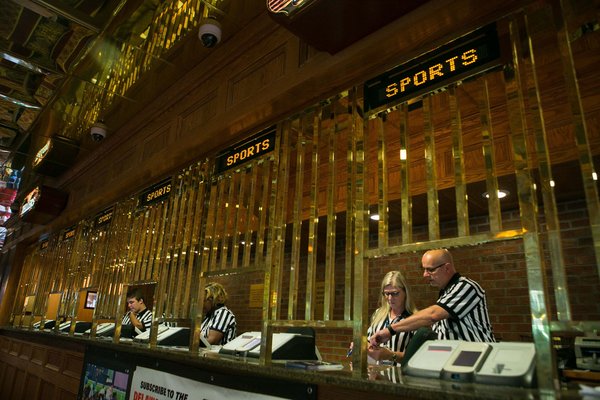What Does Plus 600 Mean In Betting
- What Does -110 Mean in Sports Betting? The minus and plus signs are really important to pay attention to. Along with the number, they tell you tons of information about the bet and the match. Keep reading for more detailed explanations of what the plus and minus signs mean and how to read them. If you like betting on the go, check out which are.
- With money lines, remember that plus signs mean underdogs and minus signs mean favorites. North Carolina is an underdog at +135 and since they are the underdog, you make more than you bet if they win. A bet on North Carolina would pay $135 for every $100 you bet. When betting on favorites to simply win, you won’t be getting as much as you bet.
As someone who reports on the latest NJ sports betting news, I can easily answer questions about the latest casino partnership or online sports betting platform launch.
(In case you didn’t know, DraftKings Sportsbook just launched its sports betting app in New Jersey.)
What I can’t answer is any question about what it means to actually place a sports bet. Since I am writing less about online poker these days and more about legalized sports betting, it seems appropriate that I understand what all the fuss is about.

+800 in sports betting basically means that for every $100 you wager, it would return to you $800 plus your bet back for a total layout of $900. Provided you win the bet. The + before the amount shows that the team you're betting on is the underdo. American Odds are the default odds at American sportsbooks. These odds are based on winning $100 for a given bet. Betting a Favorite: The odds for favorites will have a minus (-) sign, and represent the money you need to risk to win $100. So if you're betting on the Packers at -140 against the Vikings, that means Green Bay is a slight favorite.
I began my quest by seeking the answers to what might seem like some fundamental questions. As someone whose only gambling vice to date is poker, the thought of placing my first informed sports bet is intimidating, to say the least.
I say “informed” because I will confess to placing bets while at the horse races. So that you know, I usually choose the horse based on its colors and nothing more.
But that is about to change.
So, what is a line anyway?
Now, don’t laugh. It is the one question I have had for quite a while and have been too embarrassed to ask.
Theline is merely the number assigned by the bookmakers handicapping the team perceived as more likely to win.
For example, if Team A is perceived to be seven points better than Team B, the bookmaker can handicap Team A by seven points. The line becomes Team A to win by more than seven points or Team B to lose by less than seven points.
Come to find out, that example is a point spread bet. Of course, that opened a whole new can of worms … the different types of sports bets.
So, I went down that rabbit hole next.
What are the different types of bets?

There are a ton of resources on sports betting out there. I am not going to lie, my quest to understand the types of bets ended up confusing me more than helping.
That is until I found some straightforward explanations from TheLines.com.
Here are the types of sports bets I found:
Point Spread Bet: Described above, the point spread bet is the most popular type of sports bet. It’s how the sportsbook evens the playing field.
Moneyline Sports Bet: Without knowing it, I have placed many, many moneyline bets throughout my life. To place a moneyline bet, the sports bettor picks a team a to win. It’s as simple as that.
Parlay Sports Bet: A parlay bet is a single bet that relies on two or more specific outcomes to be a winner. For instance, a sports bettor might bet Team A to win by more than 10 points AND Team C to win by more than six. Both teams must win to collect on the bet.
In-Play Sports Bet: In-play sports bets take place during the game and offers game-specific odds and options for bets during the game.
Prop Bet: Is a bet on a specific player or event. TheLines.com uses this example:
How Many Yards Will Tom Brady Pass For?
Over 197.5 -110
Under 197.5 -110
Looking at that example, my next question was …
What do the plus and minus mean in sports betting?
In the example above, a $110 bet would pay $100. When a sports bettor goes to collect, he will receive $210 — the $110 bet plus $100 for the win.
Most bets include a handicap, so the odds on both sides of the bet are even or close to it. Moneyline bets are different because there is no point spread to even out the odds.
As an example:
Patriots -600
Redskins +400
Looking at the odds, the Patriots are the favorite to win the game. The team with a minus (-) is usually the favorite, while the team with a plus (+) is often the underdog.
A bet on a favorite will pay out less. In the above example, a $600 bet on the Patriots will pay $100, while a $100 bet on the Redskins would pay $400.
The more I learn, the more I need to learn
I surprised myself by looking at some images of boards from a few sportsbooks and realized I understood some of it. There is still so much to learn.
I find myself consulting a sports betting dictionary often as I come across terms I do not understand. (Trust me; there are a lot of them.)
I’m still apprehensive toward placing that first bet. The more I read, the more I want to know, and the amount of information out there is overwhelming.
The NFL regular season kicks off in just a month. My goal is to place my first sports bet then, even if it is only theoretical. The big problem is I am not sure I will be in a state that has legalized sports betting.
Until then, though, I still have a lot to learn. Sure, I could just dive into sports betting head first, but I like money too much for that approach.
In the world of sports betting, a money line bet is simply betting on which team you expect to win. It doesn’t have anything to do with a spread. You may also see a money line bet listed as “Money Line” or “ML” in different spaces.
What Does 160 Mean Betting
Money lines are represented in negative and positive values.
Negative money line: -145, -220, or anything similar
What Does 220 Mean Betting
When you see a minus (-) sign in front of a price, it shows you that team is the favorite to win the game.
That number also indicates how much money you need to bet/spend in order to win $100.
For example, a -220 money line means you need to bet $220 in order to win $100 provided the team you bet on actually does win.
Heavy favorites are known in sports betting as a “chalk” pick. A heavy favorite usually has a number pushing +300 or more. Here, you’re wagering a lot on the favorite to win a little. Don’t assume that a heavy favorite, or chalk pick, is a guaranteed winner…
Positive money line: +145, +220, or anything similar
When you see a plus (+) sign in front of a price, it shows you that team is the underdog. Higher numbers like +400, +500, +5000, etc. represent how much of an underdog the team is in the game. The higher the number the more likely the team is expected to lose in the eyes of the oddsmakers.
The number also indicates how much money would win in comparison to every $100 you wager.
For example, a +150 money line means you would win $150 for each $100 wager you place should that team win the game.
Money line examples:
What Does Mean In Betting 110
Lets use an NFL example here:
New England Patriots -240
Miami Dolphins +220
When Betting What Does Mean
To bet the New England Patriots to win on the money line, you would need to spend $240 on the bet for a chance to win $100 if the Patriots beat the Dolphins. Your return would be $340 – the original $240 stake (bet) and the $100 bet profit.
To bet the Miami Dolphins to win on the money line, you would spend $100 on the bet for a chance to win $220 if the Dolphins, as the underdog, beat the Patriots. Your return would be $320 – the original $100 stake (bet) and the $220 profit.
What Does Plus 600 Mean In Betting Line
In both situations, it doesn’t matter if the team you bet on wins by one point or 100 points. You’re purely betting on the team you believe will win the game. As Al Davis said, “Just win, baby.” That’s exactly what you’d be looking for out of your selection. It doesn’t have to be pretty, it just has to happen or your original stake is lost.